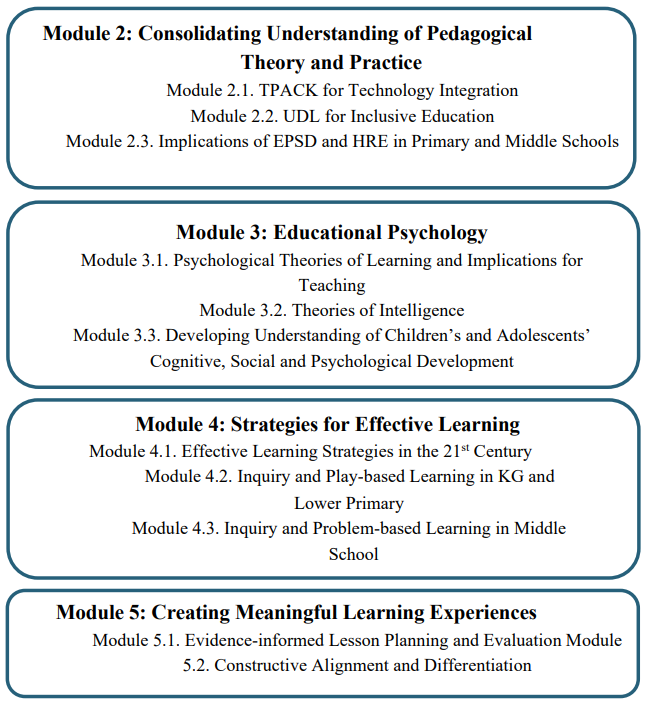Pre-service Teacher Education Programme: Year 3 Semester 1 E-Learning Course for Teacher Educators
5
(14 မှတ်ချက်)
Certified
4 week(s)
201 စာရင်းသွင်းထားသူဦးရေ
6265 ကြည့်ရှုထားသူဦးရေ

Share On :
သင်တန်းအကြောင်းအရာ ဖော်ပြချက်
Overview of the course
The course is organised into the following modules:
သင်တန်းရည်ရွယ်ချက်များ
After completing this course, teacher educators will be better equipped with the competencies to effectively deliver the Pre-service Teacher Education Year 3 Semester 1 curriculum.
သင်ယူမှုရလဒ်များ
By completing this course, teacher educators will be able to:
- demonstrate their understanding of the interconnectedness of education and society, the significance of key agencies of education and the importance of the constructive alignment in designing curriculum to meet the needs and aspirations of diverse learners and communities;
- apply pedagogical frameworks - Technological Pedagogical and Content knowledge (TPACK), Universal Design for Learning (UDL), Education for Peace and Sustainable Development (EPSD) and Human Rights Education (HRE) – to attain Year 3 learning goals of primary and middle school specialisation tracks;
- demonstrate their understanding of key educational psychology, philosophies and theories that are relevant to delivering the Year 3 Semester 1 subjects/learning areas of each specialisation track; and
- plan, prepare and deliver their Year 3 Semester 1 subject/learning area, applying various teaching strategies and assessment approaches to meet the needs of diverse learners in classrooms.
ဤသင်တန်းကိုတက်ရောက်ရန် စနစ်သို့ဝင်ပါ
သင်ကြားပို့ချချက်များ
Introduction
Overview of the Modules
Warm-up Activity
Introduction to Year 3 Semester 1 E-Learning Course
Introduction to Year 3 Semester 1 Full Lecture
Module 1.1. Year 3 Learning Goals
The Structure of New Pre-service Teacher Education Programme: Two Specialisation Tracks
Review of Primary and Lower Secondary TCSF
Module 1.1. Quiz
Module 1.1. Summary
Module 1.1. Full Lecture
Module 1.2. Education and Society
The Relationship Between Education and Society
A Humanistic and Holistic Approach to Education
Normal 0 false false false EN-US JA TH /* Style Definitions */ table.MsoNormalTable {mso-style-name:"Table Normal"; mso-tstyle-rowband-size:0; mso-tstyle-colband-size:0; mso-style-noshow:yes; mso-style-priority:99; mso-style-parent:""; mso-padding-alt:0in 5.4pt 0in 5.4pt; mso-para-margin:0in; mso-para-margin-bottom:.0001pt; mso-pagination:widow-orphan; font-size:12.0pt; font-family:"Calibri",sans-serif; mso-ansi-language:EN-GB; mso-bidi-language:TH;} Lessons from the Global Pandemic
Student Well-Being and Resilient and Inclusive Education Systems
Module 1.2. Quiz
Module 1.2. Quiz
Module 1.2. Summary
Module 1.2. Full Lecture
Module 1.3. Teachers as Leaders
Instructional Leadership
Distributed Leadership
School-community Relations
Module 1.3. Quiz
Module 1.3. Summary
Module 1.3. Full Lecture
Module I Summary
Module 2.1. TPACK for Technology Integration
Technology Integration Across the Curriculum – TPACK Framework
Use of TPACK in Primary and Middle School Contexts
Using a Range of Educational Technologies in Practice – SAMR Model
Module 2.1. Quiz
Module 2.1. Summary
Module 2.1. Full Lecture
Module 2.2. UDL for Inclusive Education
UDL for Differentiation and Flexibility
UDL for Teaching, Learning, and Assessing a Diverse Group of Students
Module 2.2. Quiz
Module 2.2. Summary
Module 2.2. Full Lecture
Module 2.3. Implications of EPSD and HRE in Primary and Middle Schools
Whole School Approach for EPSD
Whole School Approach to EPSD in Primary and Middle Schools
Whole School approach for HRE
Whole School Approach to HRE in Primary and Middle Schools
Dialogues for HRE
Integrated Curriculum
Module 2.3. Quiz
Module 2.3. Quiz
Module 2.3. Summary
Module 2.3. Full Lecture
Module II Summary
Module 3.1. Psychological Theories of Learning and Implications for Teaching
Reflection on Some Foundational Learning Theories from Year 1 and Year 2
Cognitive Learning Theory and Mode
Social constructivist learning theories
Educational Psychology: Myths and Misconceptions
Module 3.1. Quiz
Module 3.1 Summary
Module 3.1. Full Lecture
Module 3.2. Theories of Intelligence
Consolidating and Critiquing the Theory of Multiple Intelligences in Practice
Intelligence Theories for Teaching and Learning
Module 3.2. Quiz
Module 3.2 Summary
Module 3.2. Full Lecture
Module 3.3. Developing Understanding of Children’s and Adolescents’ Cognitive, Social and Psychological Development
Children’s and Adolescents’ Cognitive, Social and Psychological Development
Consolidating Understanding of Learner Development and Diversity
Student Mental Health
Module 3.3. Quiz
Module 3.3. Summary
Module 3.3. Full Lecture
Module III Summary
Module 4.1. Effective Learning Strategies in the 21st Century
Critical and Creative Thinking
Cooperative Learning and Blended Learning
Different Strategies used in Blended classrooms
Feedback to Enhance Learning
Self-regulated Learning
Module 4.1. Quiz
Module 4.1. Summary
Module 4.1. Full Lecture
Module 4.2. Inquiry and Play-based Learning in KG and Lower Primary
Play-based Pedagogies
Promoting Interaction and Collaboration
Inquiry-based and Play-based Learning in KG and Lower Primary
Module 4.2. Quiz
Module 4.2. Quiz
Module 4.2. Quiz
Module 4.2. Summary
Module 4.2. Full Lecture
Module 4.3. Inquiry and Problem-based Learning in Middle School
Promoting Interaction and Collaboration
Problem-based Learning in Middle School
Module 4.3. Summary
Module 4.3. Full Lecture
Module IV Summary
Module 5.1. Evidence-informed Lesson Planning and Evaluation
Links with pedagogical models
Lesson Planning with the ITPR Model
Planning, Assessing and Evaluating for Effective Teaching and Learning
Module 5.1. Quiz
Module 5.1. Summary
Module 5.1. Full Lecture
Module 5.2. Constructive Alignment and Differentiation
Using relevant curriculum documents to design learning experiences
Assessment and evaluation
Module 5.2. Quiz
Module 5.2. Summary
Module 5.2. Full Lecture
Module V Summary
အကျဉ်းချုပ်
Course Summary
သက်ဆိုင်သော သင်တန်းများ


